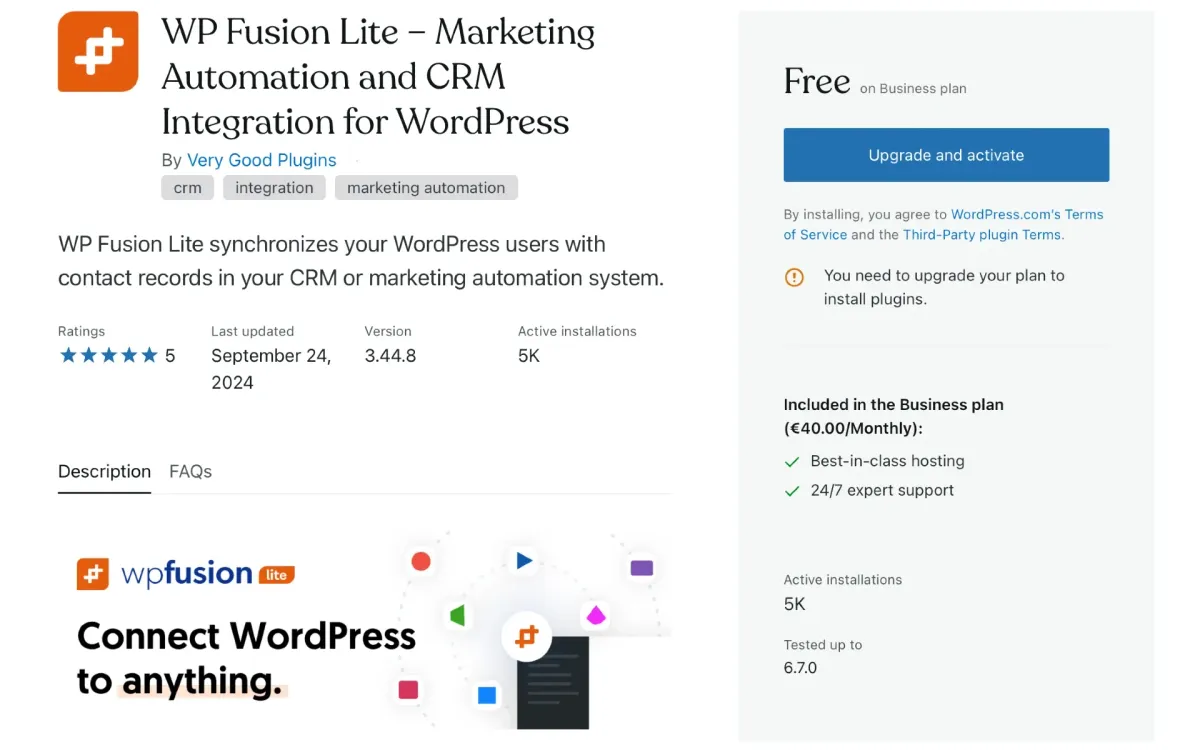
On October 12, 2024, Jack Arturo, founder of Very Good Plugins and developer of the popular WP Fusion plugin, sent a cease and desist letter to Automattic, the company behind WordPress.com, regarding the unauthorized use of the WP Fusion trademark. Just one day ago, on October 18, 2024, Automattic responded, agreeing to remove the WP Fusion Lite plugin listing from WordPress.com.
WordPress is an open-source content management system that powers an estimated 43% of websites globally. The WordPress ecosystem consists of several key entities:
- WordPress Foundation: A non-profit organization founded in 2010 to protect open-source software and ensure WordPress remains freely available.
- WordPress.org: The home of the free and open-source WordPress project, including the plugin repository containing over 60,000 free plugins.
- WordPress.com: A commercial website-building platform run by Automattic, using the WordPress software.
- Automattic: A for-profit company founded by Matt Mullenweg, who is also involved in the WordPress Foundation and WordPress.org.
According to Jack Arturo, in September 2023, WordPress.com created a private mirror of the WordPress.org plugin repository, making it available exclusively to WordPress.com hosting customers. This mirror included the WP Fusion Lite plugin, which was displayed without permission and used to promote premium hosting plans.
Arturo, who owns the federally registered trademark for WP FUSION (U.S. Registration No. 6,052,437), felt this unauthorized use created confusion among users and potentially infringed on his trademark rights.
On October 12, 2024, Arturo sent a cease and desist letter to Automattic, demanding:
- Immediate removal of the "WP Fusion Lite" plugin from WordPress.com
- Cessation of use of any trademark, logo, or name confusingly similar to WP Fusion
- Written confirmation of compliance within 10 business days
On October 18, 2024, Automattic's General Counsel responded to Arturo's letter. While disagreeing with the assertions of intellectual property infringement, Automattic agreed to resolve the matter swiftly and amicably. The company confirmed that WP Fusion Lite is no longer listed on WordPress.com and has been disabled on its landing page.
This dispute highlights several ongoing issues within the WordPress ecosystem:
- Trademark protection in open-source software: While WordPress plugins are often open-source, developers can still claim trademark rights to names and branding associated with their plugins.
- Conflict of interest concerns: Some community members have raised questions about the multiple roles held by Matt Mullenweg in both the open-source WordPress project and the for-profit Automattic.
- Plugin distribution and hosting: The dispute may set a precedent for how hosting providers and plugin marketplaces approach the distribution of "lite" or forked versions of premium plugins.
- Community trust: The incident has sparked discussions about trust within the WordPress community and the balance between commercial interests and open-source principles.
The dispute has generated significant discussion among WordPress developers and users. Some view Arturo's actions as a necessary defense of trademark rights, while others see it as potentially overreaching.
Mike Gillihan, founder of CauseLabs, questioned the consistency of trademark enforcement, comparing the WP Fusion case to Automattic's handling of other plugins.
Angela Bowman, a WordPress consultant, defended Automattic's right to host GPL plugins but acknowledged the complexity of trademark issues in the WordPress ecosystem.
With the removal of WP Fusion Lite from WordPress.com, the immediate trademark dispute appears to be resolved. However, the incident may have lasting implications for how plugins are distributed and branded on major WordPress hosting platforms.
For plugin developers, this case underscores the importance of understanding and protecting their intellectual property rights, including trademarks, even within the open-source ecosystem.
Key Facts
- Jack Arturo sent a cease and desist letter to Automattic on October 12, 2024
- Automattic responded on October 18, 2024, agreeing to remove WP Fusion Lite from WordPress.com
- WP Fusion has a registered trademark (U.S. Registration No. 6,052,437) from May 12, 2020
- The dispute centered around Automattic's hosting of the "WP Fusion Lite" plugin on WordPress.com
- WP Fusion Lite had over 5,000 active installations on WordPress.com before its removal

